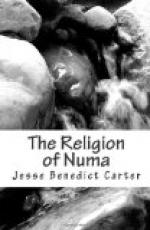In the introduction of the Great Mother the Sibylline books performed their last and most notable achievement. Hereafter they introduced no new deities, and were consulted only occasionally, chiefly for political purposes, for example in B.C. 87 against the followers of Sulla, and in B.C. 56 in connexion with a scheme of purely political import. Their work was done, and we have seen in what it consisted. For three hundred years they had been encouraging the growth of superstition. From their vantage ground of the temple of Juppiter Optimus Maximus, the essence of all that was most patriotically Roman in Rome, they had been giving forth these infallible oracles which seemed so much superior to the simple “yes and no” answers with which the old Romans had been content in their dealings with the gods. In times of peril by pestilence and by battle they had given advice, and the pestilence had ceased and the battle had turned to victory. It seemed indeed that the Sibyl deserved the gratitude of Rome. Time alone could teach them what the books had really given them. It was only in the coming generations that it became evident that the abuse of faith, the substitution of incantation for devotion, was destructive of true religion. It is the effect of this substitution on the various classes of society under the new and trying social conditions of the last two centuries of the republic that forms the theme of our next chapter.
THE DECLINE OF FAITH
It is the fashion of our day to think no evil of Greece. In art we are experiencing another Renaissance, not like that of the fourteenth and fifteenth centuries in a revival of ancient Rome, but in a movement leading behind Rome to the classic and even the pre-classic models of Greece. In itself it is a healthful tendency, a needed corrective to the sensational search for novelty which characterised the closing years of the nineteenth century. But in our admiration for the Greek spirit we ought not to forget that after Alexander that spirit lost much of its beauty, and aged very rapidly. We may indeed regret the fact that Rome, like certain persons of our acquaintance, seemed at times to possess a strong faculty for assimilating the worst of her surroundings, while occasionally curiously unresponsive to the better things; and yet we ought in justice to strive to realise the fact that not only is the Greek spirit at its best an unteachable thing, but that at the historical moment when Rome came under that influence the Greek world was very old and weary. It was Rome’s misfortune and not her fault that when she was old enough to go to school, Alexandrianism with its pedantic detail was the order of the day in mythology, and the timorous post-Socratic schools were the teachers of philosophy. Naturally if Rome had been another Greece she would have worked back from these later forms to the truer, purer spirit, but Rome was not Greece, and no thoughtful




